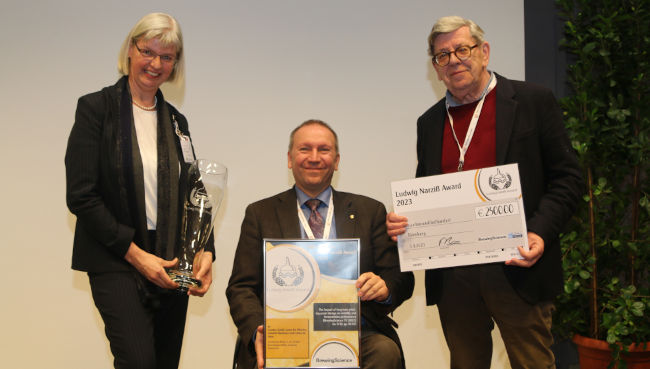Dr Carsten Zufall wins Ludwig Narziß Prize 2022
Award ceremony | Dr Carsten Zufall, Cerveceria Polar, Venezuela, is the winner of the Ludwig-Narziß Prize for Brewing Science 2022. On the occasion of the 15th Trends in Brewing in Ghent at the beginning of April 2023, the research prize for the most practice-relevant publication of 2022 in the scientific magazine BrewingScience was awarded by Editor-in-Chief Dr Lydia Junkersfeld.
The laudation was held by Prof. em. Guido Aerts from Ghent, who first paid tribute to the eponym Prof. Ludwig Narziß, who passed away at the end of 2022. His lifelong research goal was the search for practical knowledge from brewing science for brewing practice.
Exactly this purpose was best served by the article "The impact of long-term pitching yeast storage on viability and fermentation performance" from BrewingScience 75 (2022), no. 9/10, pp. 92-97, by Dr. Zufall and his co-authors Laura De Oliveira, Isabella Mendoza, and Carlos de Lima from Cerveceria Polar in Venezuela, as Prof. Aerts, member of the editorial board of BrewingScience, pointed out. The starting point for the work at the time was the necessary suspension of brewing operations due to the political situation in Venezuela. This gave rise to the question of how best to provide a large amount of pitching yeast after a long brewing break.
The purpose of this study was to evaluate which yeast storage conditions allow the pitching yeast to conserve maximum viability and fermentation performance. For that, a lager yeast cropped after a third fermentation cycle was subjected to different pretreatment and storage conditions during a three-month period. Pretreatment included washing the yeast with sterile process water. Storage conditions were varied by different gassing regimes with either air or carbon dioxide. Alternatives for an activation protocol prior to fermentation were also evaluated at laboratory scale after storage. Yeast was tested weekly for viability and microbiological purity. Additionally, a laboratory scale fermentation was performed monthly to evaluate the performance of the yeast from the different trials.
Finally, the combination of the most promising pretreatment, storage conditions and re-activation technique was successfully tested on industrial scale. The availability of a large amount of pitching yeast complying with the required viability, fermentation performance and microbiological purity is a decisive advantage during the time-critical run-up procedure after a brewery shutdown. This may save the brewery several weeks before beer sales can resume.
Keywords
BrewingScience research yeast storage Ludwig Narziß Award for Brewing Science
Authors
Lydia Junkersfeld
Source
BRAUWELT International 2023



